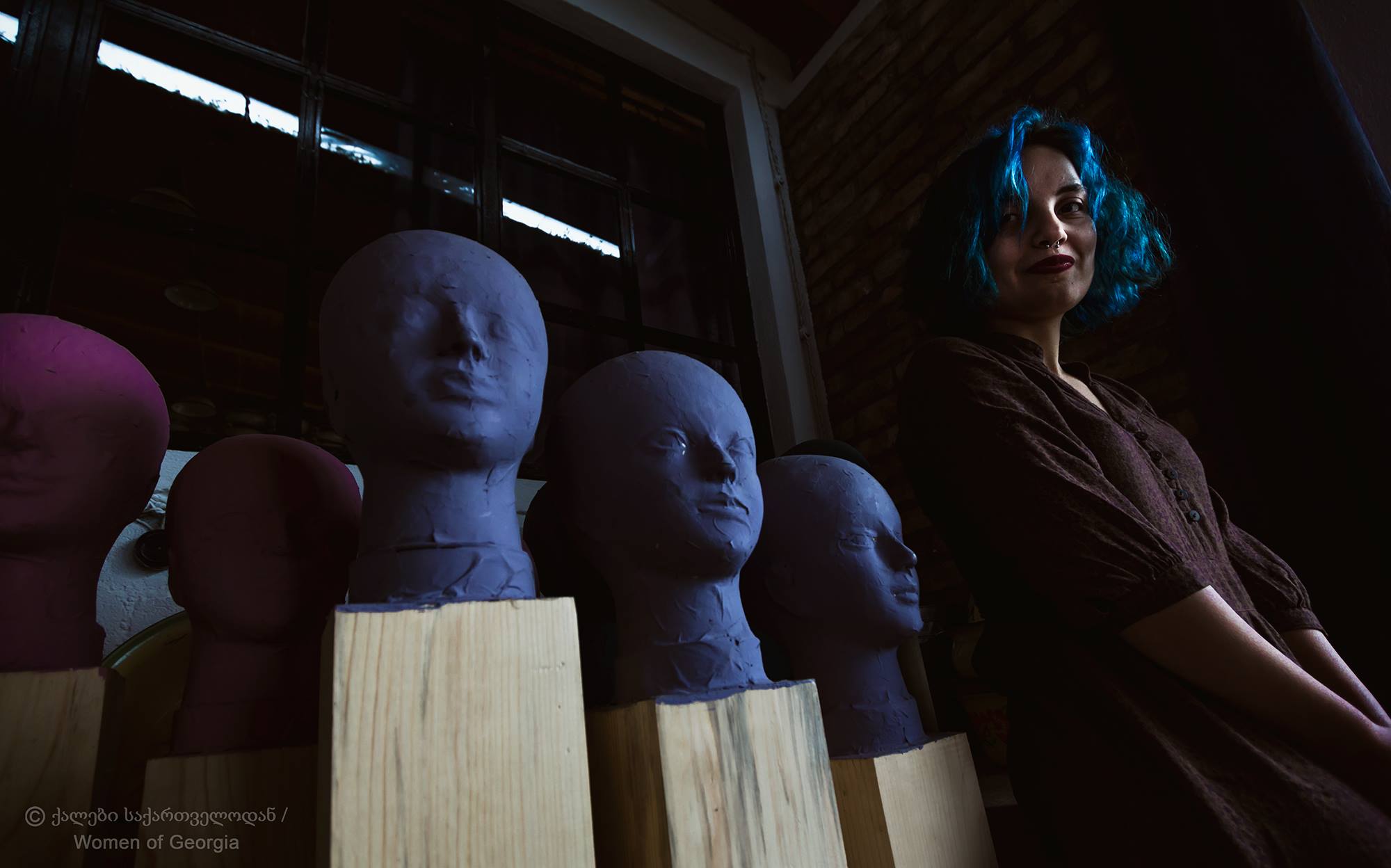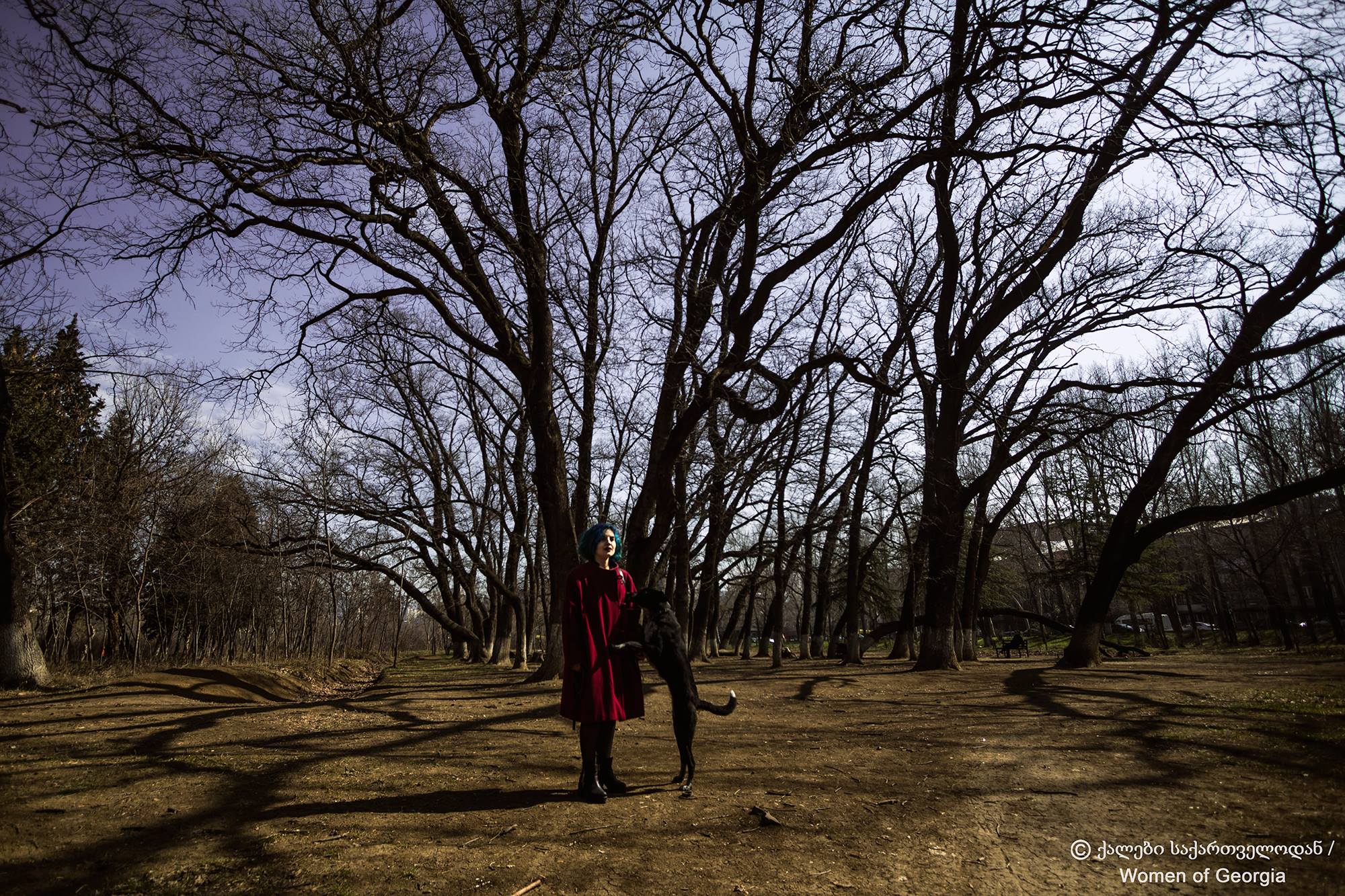Life after rape: The story of 22-year-old Salome Zandukeli
In the project “Women from Georgia”, women from various cities and regions share their stories. They touch on topics that society often prefers to remain silent on. Their openly-told stories about their identity, families and children vividly demonstrates the problems that women face in modern-day Georgia.
Twenty-two-year-old Salome Zandukeli is one such individual who shared her story. Two years ago she was raped. She talks about what she had to go through, how to deal with it and start life anew:
It happened outside
It happened two years ago on 20 February 2016. I had just started working, and I was working more than one job. I was teaching math and English to children, and so in the evenings I had to go from Kavtaradze to Sololaki, and then home to Digomi where I arrived generally late at night, around 12pm or so.
That day I decided to save some money and didn’t go by taxi. I went home by foot from Didube metro. I wasn’t afraid – I was born and grew up in this city.
Along the way, some guy started pestering me, trying to get me to talk with him. I didn’t answer his questions of course – such behavior from boys in Tbilisi isn’t exactly rare. But he didn’t give up, and when we approached the district administration building he started insulting me. I couldn’t restrain myself and responded in the same way.
A few minutes later, I noticed that he was following me along with two other boys. One was quite young while the other was a teenager, about 15-16 years old. They caught up to me. Nobody heard my cries for help that night. They dragged me behind the district administration building. They raped me. At one time I got a hold of a stone and I tried hitting them with it. At another time the muddy water started to suffocate me.
I remember I felt as if I was being buried alive, I was breathing in earth, it got into my eyes, my mouth… my life flashed before my eyes. They say that this happens before death, and I thought I would die. I didn’t hope for a miracle, though it kept me alive. And all of this took place in front of the eyes of a small boy. Then they left, having taken all my money.
When I got myself together, I went to the police immediately. There was a local police department not far from there. I went there in a torn skirt and in a horrible condition. The policemen first didn’t believe me, and decided I was some kind of vagrant.
By this point I was screaming, we went to the place where it happened. There, they started to believe me that everything had happened just as I had told it. My things were scattered around the scene, as was my underpants. Having seen all this, one of the policemen began to advise me not to talk about what had happened; ‘you’re quite young’ he told me, ‘you’ll ruin the rest of your life’. I started screaming again. It was strange, but I wasn’t crying. The anger in me was suffocating.
In the end, they opened up a case. They found them quickly. They didn’t catch the ten-year-old boy of course, but they took in the other two. The underage boy received six years in prison, and the older one received thirteen. The trial process was, of course, led by a woman.
Trial

It was only later that I found out about the criminals. The fifteen-year-old was a ‘professional’ beggar, and the older one was married and had three children. He didn’t admit to the crime. His lawyer was tough – a woman by the way, but she never showed any solidarity or sensitivity.
I had a little more pity for the younger boy. He couldn’t even read or write, and he didn’t even know his own birthday. He put an X instead of a signature. What was there to talk about with him? I think there should be preventative measures in place, not only prison sentences to prevent such actions.
He’ll sit in prison for six years, and then he’ll be released – then what? What if he decides to take revenge? And if he does, where can I hide?
It was very unpleasant at the trial to be a witness and victim at the same time. Another strange thing was that the court does not count the act as rape unless there was penetration. And so at the trial a sort of tragi-comic situation came about in which I had to discuss this issue with people I did not know, almost down to the level of centimeters of penetration.
And throughout it all, I wanted to be present at all the court meetings, but when they abruptly changed days and court times, they generally didn’t tell me.
At the trial for the underage boy, they didn’t let me in if the trial session was closed. The family of the second boy tried to cajole me, to convince me into dropping the charges, promising that he’d marry me. Naturally, I didn’t make any compromises. When the court announced the verdict – 13 years – his wife grabbed my hair and tried to beat me.
Pregnancy
One month later, I noticed my appetite had shot up. It turned out that I was pregnant. This was a shock for me. I didn’t even think about keeping the baby, but even if I had, I wouldn’t have withstood the pressure from those around me.
I remember how an older relative told me: “What, you’re going to give birth and raise an idiot?”
I got an abortion. It was difficult. And made more so by the fact that my bank cards remained in the possession of the police. There were practically days when there was nothing to eat. And I don’t know how I would have made it work out had it not been for the help of one of my relatives who gave me some money.
For that reason, I believe that the state should pay for an abortion in such circumstances.
My mother

When all this took place, my mother and I were living together. My mother had been struggling with Alzheimer’s disease for five years.
Before her diagnosis, we always had problems because she was behaving strangely and I didn’t understand what was wrong with her. For example, she wouldn’t let me walk in front of the TV screen, because she’d think that someone was watching us from the other side.
Photographs would speak to her, icons which my father had painted would steal things from us. Sometimes she would speak to the mirror with her own reflection. Once when I wasn’t home she caused a flood in the neighbour’s apartment downstairs and she was taken to the psychiatric hospital. There, they discovered she had Alzheimer’s.
With time, her behavior became more and more illogical, but she could stay at home by herself. She lost a lot of the traits that made her who she was, but I learned to love her even more.
That night when I was raped, I got into the bathroom immediately to wash. My mother came in behind me, saw the bruises and the blood on my body and asked what had happened. I told her everything. She cried for a long time. And then she asked an hour later – what was wrong with me, had I taken a fall outside?
My mother recently went into a coma, and spent two months in hospital. She died a week ago.
People
I didn’t hide what had happened to me from anyone. I told everyone. I was surprised that a number of women had gone through the same thing, and that they had kept it a secret. Or they had decided to marry their rapists. I was barely able to imagine that for a second.
The reaction of those around me was rather varied: my girl-friends were around me all the time and supported me in a number of ways. Sometimes they ended up crying when they heard about my misfortune, and I had to calm them. I continued to work; my colleagues are extraordinary people, and work helped me tear myself away from stupid thoughts.
I had a boyfriend back then. He said that had it been him in my shoes, he would have killed himself. That would have been the most terrifying thing for me. He reminded me how he had told me to buy an airgun and keep it on me for self-protection.
Some of my relatives told me not to tell anyone about what had happened, which would undoubtedly sentence me to eternal loneliness.
Such ‘advisors’ annoyed me. I was curt with them. And here they were, telling me that I should live with a sense of guilt and that I should be ashamed of what happened.
In some literature and cultures the raped woman is often considered shameless – as if it’s her that has no conscience, not her rapist. What’s more is the fact that in literature, there isn’t a model of a woman who has survived and overcome violence against her.
They either kill themselves or her life is destroyed entirely. But, judging from personal experience, I know that it is definitely possible to continue, to fight and survive. The fight was long and continuous. I continue to fight with depression, insomnia and terrifying dreams even today. But I still believe that I’m not a victim, but rather a survivor of tragedy.
The project is run by the ‘Women from Georgia’ initiative group (Authors: Mika Chitaia, Ida Bakhturidze, Nino Gamisonia), Photos: Nino Baidauri, Salome Tsopurashvili)
The platform was created with the support of the National Democratic Institute (NDI) with financing by the Swiss Agency for Development and Cooperation. Currently, the recording of new interviews and their preparation for publication takes place within the framework of the project of the Institute for East-West Management (EWMI) – ACCESS with funding by the United States Agency for International Development (USAID).


















